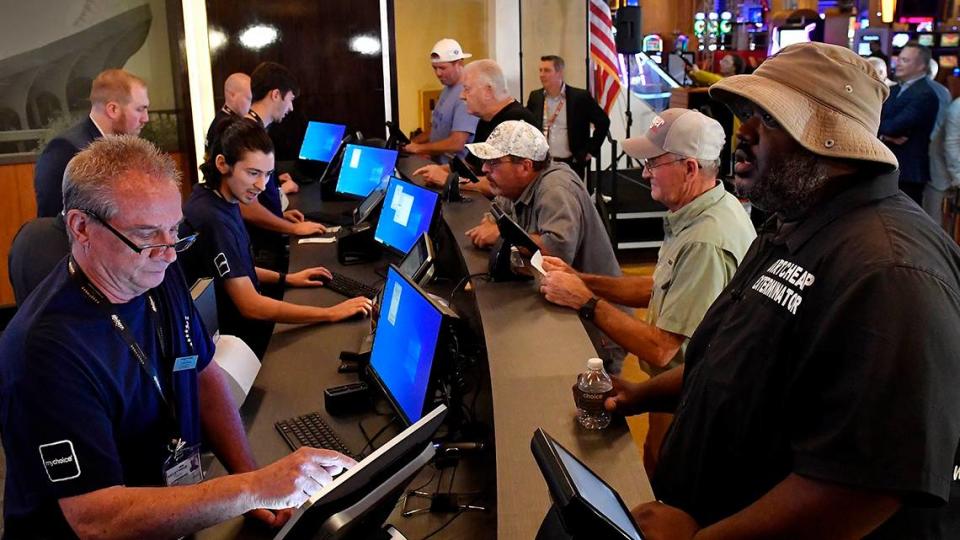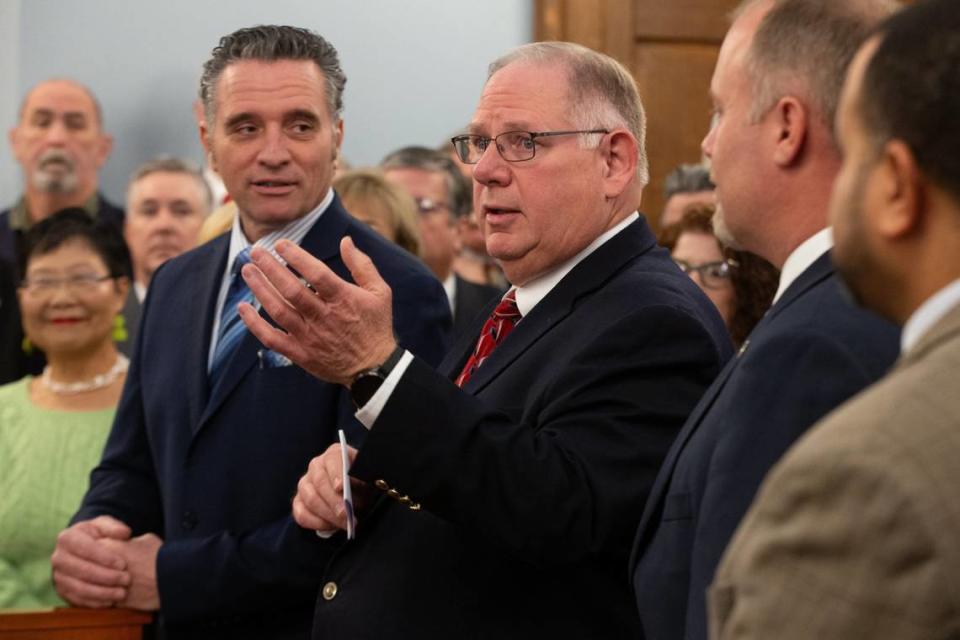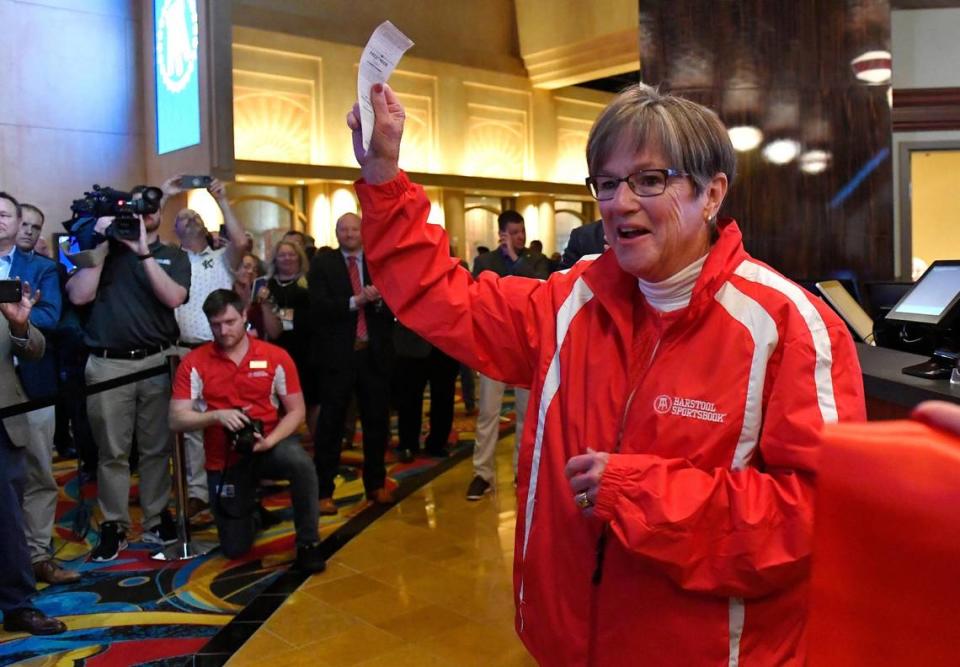Kansas plan to lure Chiefs could include $1 billion bond backed by sports gambling funds
Reality Check is a Star series holding those with power to account and shining a light on their decisions. Have a suggestion for a future story? Email our journalists at RealityCheck@kcstar.com.
A Kansas proposal to attract the Kansas City Chiefs across state lines may rely on up to $1 billion in bonds backed by sports wagering and lottery revenues, in addition to hundreds of millions in bonds secured by sales taxes.
The plan potentially places gambling at the center of financing a stadium for the Super Bowl-winning team.
As the Kansas Legislature prepares to meet in a special session next week, top Republican lawmakers are backing a plan to help finance up to two stadiums – for the Chiefs and Royals – with Sales Tax and Revenue, or STAR, bonds. The debt would be backed only by future anticipated sales tax revenues from the stadiums and surrounding development.
But the overall effort to lure one or both teams may also include issuing bonds against future revenues from sports wagering and the Kansas Lottery. Lawmakers have spent years laying the groundwork for the bonding, even as the public debate in recent days has largely focused on STAR bonds.
When the Legislature legalized sports wagering in 2022, it created a fund to attract professional sports teams to Kansas and directed most betting revenues into the fund. Lawmakers this spring also inserted language into the state budget directing excess gaming revenue above a certain threshold into the fund – further bolstering it over time.
The Legislature’s special session will focus on tax cuts. GOP lawmakers have signaled that if a tax agreement is reached, they are open to taking up legislation that would authorize STAR bond districts for the Chiefs and the Royals.
The proposal, which hasn’t been released publicly but has been described by lawmakers and lobbyists, would allow communities in the metro area to effectively compete for the teams. Most speculation about a potential Kansas site for the Chiefs has centered on Wyandotte County, where local officials appear open to a bid for the team.
Kansas City, Kansas, Mayor/CEO Tyrone Garner welcomed the concept this week, saying he hopes to see a proposal crafted in Topeka that is equitable for local taxpayers. Unified Government commissioners who spoke to The Star on Tuesday echoed those sentiments.
Kansas’ scramble for the Chiefs comes after Jackson County voters in April rejected a 40-year, ⅜ cent sales tax for stadiums. Both the Chiefs and Royals have said they are examining their options after the defeat of the tax, which would have generated an estimated $2 billion over its lifetime. The two teams and an organization called Scoop and Score formed to promote a Chiefs move to Kansas have collectively hired at least 27 lobbyists over the past week.
“Instead of taxing citizens ⅜ of a cent, people who participate in sports wagering, people who participate in the lottery, those who are making a choice – those are the folks who end up financing a large portion of the stadium,” said Sen. J.R. Claeys, a Salina Republican and vice chair of the Senate Ways and Means Committee.
The fund for attracting sports teams currently has about $4.1 million. Claeys shared projections that during the 2026 budget year, the fund will have about $36.5 million.
By 2030 the fund could have $100 million or more, according to Claeys. He predicted that growing sports betting revenues, combined with Lottery revenues, would eventually provide $25-27 million a year.
At that point, Kansas would issue bonds backed by revenues coming into the fund. Claeys predicted the wagering and Lottery revenues would be enough to pay off the bonds over time without resorting to general state revenues. The Chiefs’ lease at the Truman Sports Complex runs through January 2031.
Missouri doesn’t have sports wagering, giving Kansas an edge in the Kansas City area as fans must cross the state line to legally place bets. But Missouri voters may decide in November whether to legalize sports wagering after years of inaction by the General Assembly, potentially cutting into Kansas betting revenue.
Kansas collected only about $6.3 million in sports bet revenue last year. Claeys said wagering is still ramping up as bettors switch from illegal to legal betting. Sports betting has also come under growing scrutiny amid scandals involving professional players, but he said the inclusion of Lottery revenues could help protect against a downturn in betting.
“Those things have fail safes embedded in them,” Claeys said.

Previously, any Kansas Lottery receipts over $50 million were transferred to the state general fund. Under the new law, excess revenue above $71.5 million will be placed into the sports team fund. Claeys’ projections estimate about $9.5 million in Lottery revenue will be transferred into the sports team fund each year over the next two budget years.
The revenue bonds and STAR bonds would together represent a massive amount of public financing for a Chiefs or Royals stadium. House Speaker Dan Hawkins, a Wichita Republican, speaking to KCMO Talk Radio host Pete Mundo on Monday, placed the estimated amount of STAR bonds expected for the Chiefs at roughly $700 million.
“We don’t know the exact number yet but we believe that’s probably close to what it will be and the rest will probably have to be financed through equity of other people,” Hawkins said.

Bonding risks
A new Chiefs stadium could cost upwards of $2.5 billion to $3 billion. About $1.7 billion in bonds – both sports wagering and STAR bonds – would constitute more than half the total stadium costs.
Current Kansas law limits STAR bonds to no more than 50% of project costs, but at least one version of the legislation would authorize up to 100% STAR bond financing. The Kansas Department of Commerce, which would sign off on the bonds, has said it doesn’t intend to authorize 100% financing.
Even a STAR bond project well under that would mark a dramatic expansion of the program in Kansas, effectively the only state with the bonds.
Supporters say bondholders – not taxpayers – hold the risk if a project fails or a default occurs. But critics warn the bonds redirect tax revenue toward repayment and they question whether Kansas would truly leave bondholders holding the bag if the project risked default.
Past STAR bonds have been unrated, but Kansas would face pressure to have the bonds rated for a large issue of $700 million or more. Because the bonds are backed solely by future anticipated sales tax revenue – with the state having no obligation to raise taxes or use general revenue to repay them – it’s possible the bonds would receive a low rating, in turn driving up interest rates.
“When the project fails to generate enough sales tax revenue to cover its debt, future lawmakers will have to decide to bail out the project with additional taxpayer dollars or have the state’s creditworthiness take a hit, which may increase the state’s future borrowing costs and residents’ cost for debt-financed good and services,” Geoffrey Propheter, a professor at the University of Colorado-Denver who has studied sports and urban affairs, wrote on social media recently about the STAR bonds plan.
Kansas Gov. Laura Kelly, a Democrat, has not taken a public position on whether she would sign legislation intended to attract the Chiefs or Royals.
“Should the legislature pass a bill modifying the STAR Bonds economic development tool, the Governor will review it. Her focus continues to be on a tax cut package for everyday Kansans,” Kelly spokesperson Grace Hoge said in a statement.

Locals want ‘a voice’
Kansas City Mayor Quinton Lucas told The Star’s editorial board on Tuesday that the teams are in a favorable negotiating position, but he emphasized that even if Kansas lawmakers approve a bill, “you don’t do a $3 billion stadium deal in three weeks.”
“I think the best deal continues to be preservation of Arrowhead Stadium,” Lucas said.
Before Jackson County voters rejected a stadium sales tax, the Chiefs had rolled out a plan to renovate Arrowhead Stadium, with the Hunt family ownership planning to contribute $300 million toward a project with an estimated $800 million price tag.
Even as the Kansas Legislature prepares to act, lawmakers and the Chiefs have not said how much funding the team would put up toward a new Kansas stadium.
Scoop and Score, which shares lobbyists with both the Chiefs and Royals, says on its website that any stadium would be a “public/private partnership with the franchise owner contributing hundreds of millions of dollars to the project.”
The Kansas legislation is expected to allow, but not require, cities or counties where a stadium is built to allocate the local sales tax revenue collected in a STAR bond district to pay off the bond. Greg Kindle, president of the Wyandotte Economic Development Council, said keeping those local dollars uncommitted would be “beneficial for a community that is really clamoring for more revenue.”
“We do appreciate that,” Kindle said. “That the way it’s currently proposed is that the local community still has a voice in how those dollars are put into the deal if needed.”
Kansas City, Kansas, officials told The Star of successful projects the county has seen come to life, including major growth on the western end of the county driven in part by STAR bonds. The Kansas Speedway and Children’s Mercy Park were both financed with STAR bonds.
As the discussion among state lawmakers progresses, local leaders are thinking about how a stadium deal would end with an overall win for their constituents.
“I’m concerned about what is in it for Wyandotte County,” said Commissioner Andrew Davis, who represents the county’s 8th District, pointing to the continued costs that come with maintaining major developments like a stadium.
“I believe that as a local government, we need as much leverage as we can to be able to negotiate what that looks like.”
The Star’s Sarah Ritter contributed reporting

 Yahoo Finance
Yahoo Finance 